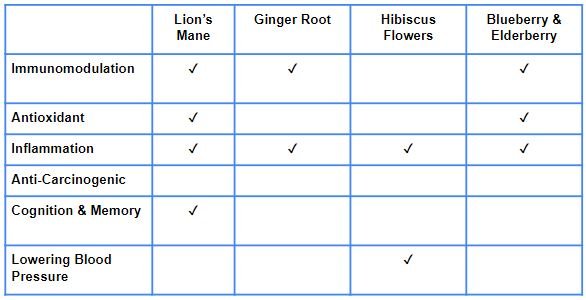The Top Health Benefits of ZOM Mushroom Tea: Berry Brain
Berry Brain is a mushroom tea blend that utilizes lion’s mane mushroom (Hericium erinaceus) as its primary ingredient, and is filled out with ginger root, hibiscus flowers, dried blueberry, and dried elderberry. Lion’s mane mushrooms are classified as a medicinal mushroom, and a growing body of scientific evidence is revealing the nootropic (cognition and memory-enhancing) properties of the fungus. Read on to learn why it’s a smart idea to add Berry Brain mushroom tea to your daily routine. This article will focus on the benefits of the ingredients in the mushroom tea that have the most scientific evidence and study behind them.
Lion’s mane is both a memory- and mood-booster due to two compounds found in the fungi: hericenones and erinacines. These molecules are involved in neuron function and growth. In 2009, when patients with mild cognitive impairment were administered tablets with dried lion’s mane powder, they performed significantly better on cognitive function tests than the control group. In a promising study on mice, subjects who were fed diets that were supplemented with lion’s mane mushrooms performed better in maze tests than the control group. The mushroom-fed mice also experienced a reduction of beta amyloid plaques in their brains, which is significant because current research shows an association between the formation of amyloid plaques and Alzheimer’s disease.
Ginger has been known and used as an anti-inflammatory for centuries, but within the last few decades, peer-reviewed scientific support has come out in support of this. Specifically, ginger contains pharmacological properties very similar to that of non-steroidal anti-inflammatory drugs (NSAIDs). Both act to suppress prostaglandin synthesis. Prostaglandins are hormones that are produced at a site of injury or infection, and high levels of prostaglandins are associated with inflammatory symptoms like fever, redness, swelling, and pain. In chronic inflammatory conditions, excess prostaglandin production increases unwanted inflammation, causing pain and discomfort beyond the natural healing process. Ginger acts to suppress prostaglandin synthesis by inhibiting a key enzyme pathway.
The research is still scarce on the medicinal uses of hibiscus, but early results are showing that ingestion of the active ingredient, Hibiscus sabdariffa, specifically in tea form, can help with lowering blood pressure in pre- and mildly-hypertensive adults. While the biological mechanism is not yet understood, hibiscus tea can safely be used by anyone who wants to supplement their health.
Blueberries and elderberries are both high in vitamin C, which is essential for a healthy and balanced diet. Vitamin C is especially recognized for its role in maintaining a healthy immune system, reducing the severity of allergic reactions, and helping to fight off infection. Vitamin C is also an antioxidant, and used as a therapeutic treatment for several diseases and disorders.
It’s important to note that when brewing medicinal mushroom tea, the process is different than the average tea-drinker may be used to. To get the most out of our tea blends, be sure to steep your tea for a full 60 minutes. This period of time allows for the mushrooms to break down and increase the bioavailability of compounds for ingestion.
Bashira Muhammad, founder of Zoom Out Mycology and creator of Berry Brain, discusses the tea blend: Berry Brain offers a ginger kick sweetened up with berries such as blueberry and elderberry. As a full time student, scientist, and business owner, it is always time for the brain-supporting benefits of our lion's mane tea. Berry Brain is one of our top sellers and we are gracious to be kid-approved on a regular basis at the farmers market for this tea too!
Medicinal properties found within the Berry Brain tea blend according to each ingredient.
Sources
Stamets, Paul, 2012. “Lion’s Mane: A Mushroom That Improves Your Memory and Mood?” Huffington Post Blog. https://www.huffpost.com/entry/mushroom-memory_b_1725583
Mori, 2009. “Improving effects of the mushroom Yamabushitake (Hericium erinaceus) on mild cognitive impairment: a double-blind placebo-controlled clinical trial.” Phylotherapy Research. DOI: 10.1002/ptr.2634
Society for Endocrinology. Prostaglandins. https://www.yourhormones.info/hormones/prostaglandins/
Grzanna et al, 2005. “Ginger–An Herbal Medicinal Product with Broad Anti-Inflammatory Actions.” Journal of Medicinal Food. https://doi.org/10.1089/jmf.2005.8.125
McKay et al, 2009. “Hibiscus Sabdariffa L. Tea (Tisane) Lowers Blood Pressure in Prehypertensive and Mildly Hypertensive Adults.” The Journal of Nutrition. DOI:10.3945/jn.109.115097
Chambial et al, 2013. “Vitamin C in Disease Prevention and Cure: An Overview.” Indian Journal of Clinical Biochemistry. DOI: 10.1007/s12291-013-0375-3



